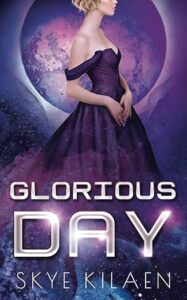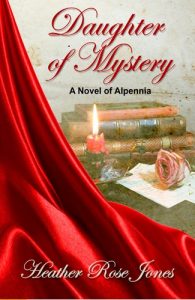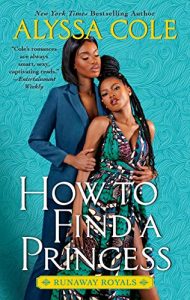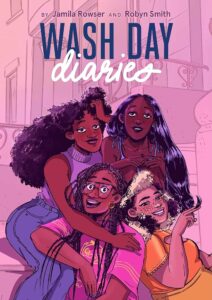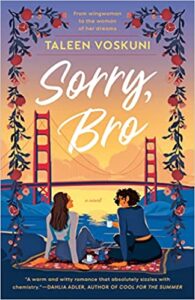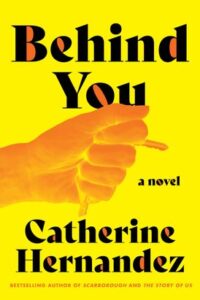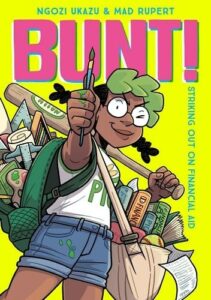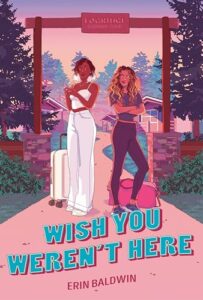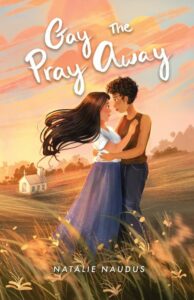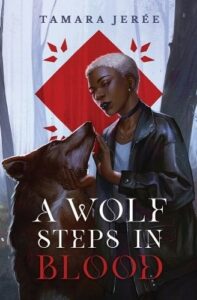There are few dynamics more swoon-worthy to me than a bodyguard romance: all of the pining of star-crossed lovers constantly at each other’s side, intense trust and protection, and often some sort of courtly intrigue. To make this sort of relationship work, the characters must be achingly careful and ultimately go through a drastic status quo change, which makes these stories compelling to me. Their genre can vary, so today, I’m doing a lightning round of reviews of three bodyguard romances: one sci-fi, one historical fantasy, and one contemporary.
Glorious Day by Skye Kilaen
My most recent read was Skye Kilaen’s Glorious Day, a low heat sci-fi romance novella. Elsenna Hazen used to be the princess’s bodyguard, until two years ago, when they shared a kiss in the gardens. Since then, she has failed to forget her hopeless love, but she has focused on feeding information to a revolutionary group trying to topple the tyrannical king. Meanwhile, the princess’s life is being controlled by ableist caretakers. She must keep up the facade that she is helpless in order to survive her political situation, but Elsenna knows her better than that. When the princess reassigns her as her bodyguard, their romance rekindles while the revolution comes to a head.
This story is ultimately about being willing to fight—for one’s beliefs, one’s love, and one’s self. Due to her own role in a corrupt system, as well as the danger she has put herself in by betraying it, Elsenna considers her life and conscience forfeit. In order to not see her love as hopeless, she has to be able to imagine a future for herself. I enjoyed the arc for the princess (who is referred to with various titles and names over time, which had a significance I liked) and the role she ends up playing, as well as how this is gradually revealed through Elsenna’s perspective.
Considering this book was under 100 pages, I didn’t expect in-depth worldbuilding, and I liked the balance of plot and relationship development. That being said, though the writing was clear and polished, I would have appreciated more description. I often knew little about the character’s surroundings, which feels like a missed opportunity, given that this is set in a sci-fi monarchy featuring both high-tech equipment and extravagant ballrooms.
I recommend this book to those looking for a fast-paced read with a good balance of star-crossed romance and political maneuvering.
You can find in-depth content warnings on the author’s website.
Daughter of Mystery by Heather Rose Jones
Earlier this year, I read Daughter of Mystery by Heather Rose Jones. This book takes place in an alternate regency setting with a magic system based in divine rituals. When Margarit Sovitre gains an unexpected inheritance, it includes a fortune but not a title, making her a target for the new baron. To remain safe, she has to rely on Barbara, a bodyguard included in the terms of the inheritance. They develop a slow burn romance while trying to navigate their new lives, which may be wrapped up in more layers of conspiracy than they realize.
Given that Barbara has been included in Margarit’s inheritance as if she were an object, there is obviously quite a large power differential that must be addressed, so the slow burn is appropriate as the characters have a lot to navigate. I appreciated the respect and care they showed for each other, and the way they were able to bond over their interests and abilities, as they both study the divine rituals despite others’ opposition. Both characters appealed to me for their wits, drive, and heart—and it’s hard to resist a lady with a sword.
I had been highly anticipating trying the Alpennia series, as I am a fan of unusual genre combinations, and the mix of historical fantasy, romance, and mystery that this promised seemed right up my alley. Unfortunately, I found myself wanting more of all of these elements. While I enjoyed the beginning and ending, the middle dragged a little for me because some of the plot elements promised in the official synopsis (re: royal conspiracies and the divine rituals) aren’t developed until late in the story. Instead, there is a lot of focus on the restrictions women faced in this time period, especially within the social politics of high society. This obviously isn’t a criticism, but rather a matter of personal expectations. If this sort of story appeals to you, and you want to read one with a sapphic romance and a touch of fantasy, I recommend this book. Personally, I was invested in enough characters, including the two who star in the second book, that I am interested in continuing in the series.
One of my main content warnings unfortunately comes with an additional caveat. There is an instance in this book of attempted sexual assault and incest that, while taken seriously in the moment, is brushed aside later to a degree that I found uncomfortable. I would have preferred this element to be followed up differently.
In addition to the already mentioned elements, this book contains brief instances of homophobia and violence.
How to Find a Princess by Alyssa Cole
Though I read it in a past year, I can’t write about this trope without including one of my favorite contemporary romances, How to Find a Princess by Alyssa Cole. Though it is the second book in the Runaway Royals series, I understood and enjoyed it as a standalone. This is an Anastasia retelling about Makeda Hicks, whose life has been run by her mother’s obsession with the idea that Makeda is secretly the princess of a fictitious country. Makeda thus tries to avoid the whole business, even—especially—when Beznaria Chetchevaliere, an investigator from the World Federation of Monarchies, shows up to convince her to make the trek to Ibarania to prove she is the true heir.
This book is, in a word, entertaining. I was drawn instantly to Bez, who subverts the concept of the stoic bodyguard by being eccentric, dramatic, and chaotic. Makeda is such a people pleaser that it ruined her latest relationship, but she finds herself bucking against Bez’s attempts to tell her how to live her life, managing to be just as stubborn as this whirlwind of a woman as she learns how to prioritize her own wants. Their push and pull as they grow to understand each other and become partners was the highlight of the book for me. I liked the emphasis on the idea that you can’t fix someone else; you can only try to be your best selves together, one step at a time.
If you’re someone whose tastes lead more toward the fantastical but who is interested in trying more contemporary romance, I recommend this book, as its at times outright whacky circumstances, along with the bodyguard element, give it that edge of surreality. I also appreciated the inclusion of Bez’s neurodivergence and of sapphic Black love.
I’ll continue to keep my eyes peeled for other bodyguard romances, and I hope that at least one of these three options suits everyone else who loves this trope.

